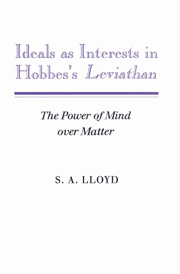Book contents
- Frontmatter
- Contents
- Acknowledgments
- A note on references
- Introduction
- 1 The standard philosophical interpretation
- 2 Hobbes's compositive reconstruction, phase one: identification of the principle of political obligation
- 3 Compositive reconstruction, phase two: religion and the redescription of transcendent interests
- 4 Hobbes's mechanism for the reproduction of social stability
- 5 Hobbes's resolutive analysis, phase two: part 4 of Leviathan
- 6 Theory in practice: Leviathan and Behemoth
- 7 Hobbes's resolutive analysis, phase one: design and detail
- 8 The treatment of transcendent interests
- 9 Hobbes's absolutism
- Notes
- Index
1 - The standard philosophical interpretation
Published online by Cambridge University Press: 08 January 2010
- Frontmatter
- Contents
- Acknowledgments
- A note on references
- Introduction
- 1 The standard philosophical interpretation
- 2 Hobbes's compositive reconstruction, phase one: identification of the principle of political obligation
- 3 Compositive reconstruction, phase two: religion and the redescription of transcendent interests
- 4 Hobbes's mechanism for the reproduction of social stability
- 5 Hobbes's resolutive analysis, phase two: part 4 of Leviathan
- 6 Theory in practice: Leviathan and Behemoth
- 7 Hobbes's resolutive analysis, phase one: design and detail
- 8 The treatment of transcendent interests
- 9 Hobbes's absolutism
- Notes
- Index
Summary
It must be extreme hard to find out the opinions and meanings of those men that are gone from us long ago, and have left us no other signification thereof but their books.
–Hobbes (EW 4:75)Listen in on most any undergraduate philosophy course in which Leviathan is discussed and you will hear a familiar story. Hobbes the individualist. Hobbes the theorist of power, advocate of the view that sheer might makes order. Hobbes the pessimist, defender of the view that the only alternative to anarchy is absolute subjection, that an overriding fear of death drives men to embrace an apparent but necessary tyranny. Hobbes the moral skeptic, subjectivist, or relativist. Hobbes the atheist. There is a received wisdom about Hobbes's political theory that has been passed from generation to generation – admittedly not without refinements or emendations, and occasional challenges – that pervades and conditions almost all serious philosophical work on Hobbes.
Among the interpretations of Hobbes's political philosophy that begin from this general picture of Hobbes is a family of views that composes what I shall loosely term the “standard philosophical interpretation.” Variants of the standard philosophical interpretation appear in the seminal works on Hobbes by David Gauthier and J.W.N. Watkins, as well as in the writings of Macpherson, Nagel, Plamenatz, and Skinner, and, more recently, of Kavka and Hampton. Indeed, most works on Hobbes contain elements of the standard philosophical interpretation, although some few writers, most notably Taylor, Warrender, and Hood, have advanced interpretations deeply at odds with the standard philosophical view; and others, such as Barry, Oakeshott, and, more recently, Johnston, have developed interpretations that would require rejection of substantial portions of the standard philosophical view.
- Type
- Chapter
- Information
- Ideals as Interests in Hobbes's LeviathanThe Power of Mind over Matter, pp. 6 - 47Publisher: Cambridge University PressPrint publication year: 1992



